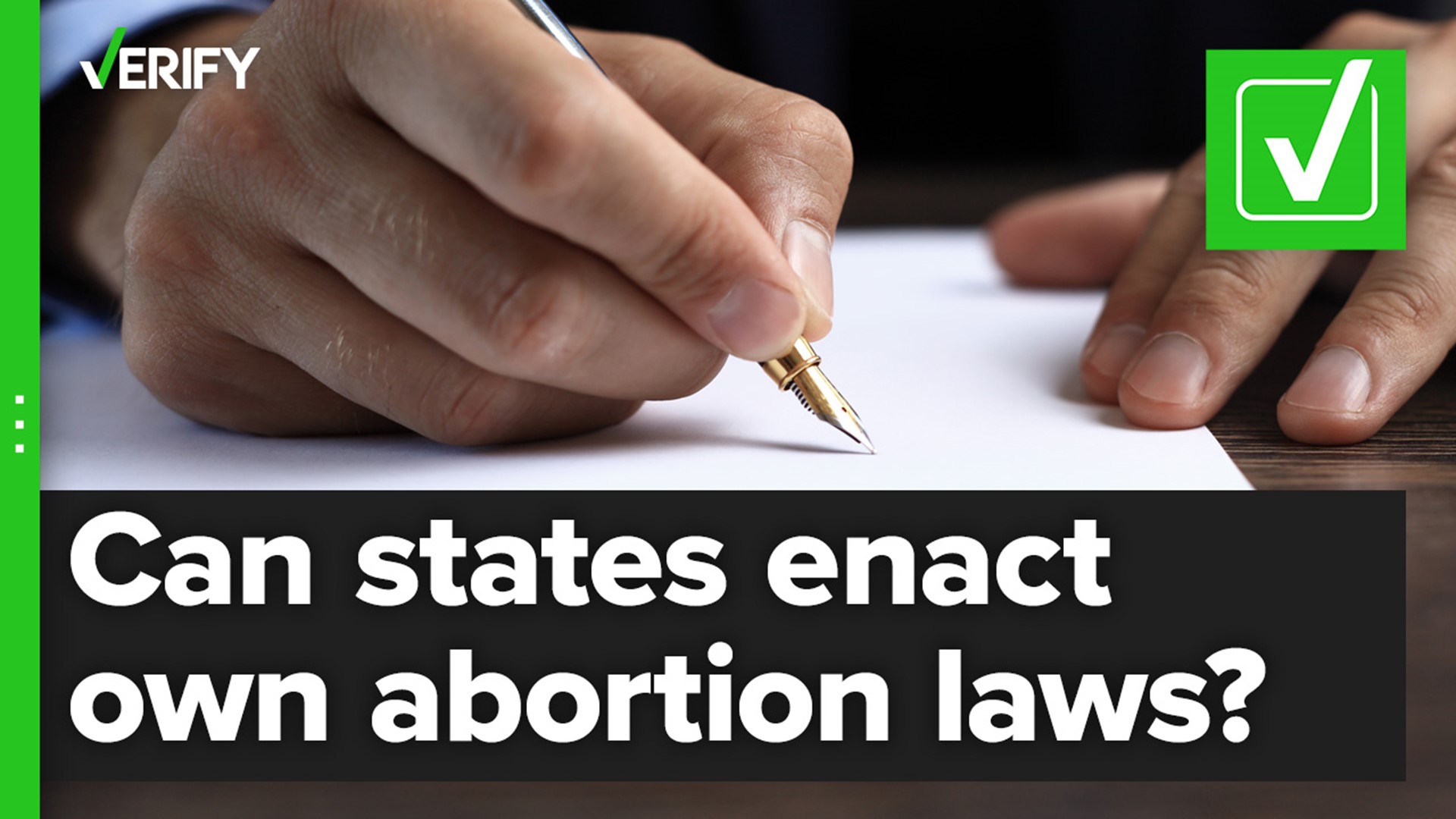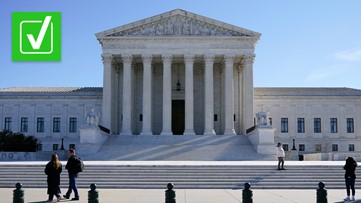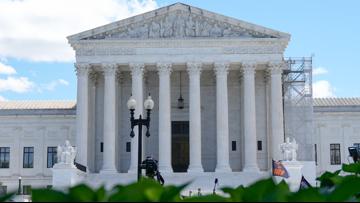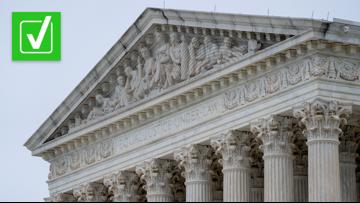On June 24, the Supreme Court overturned Roe v. Wade and ended the constitutional right to an abortion.
Since the court announced its ruling, VERIFY viewers and people online have asked questions about what the court’s decision means for those seeking abortions. The VERIFY team answered many of those questions below.
Do you have a question about the Supreme Court decision? Email us at questions@verifythis.com or message on social media @verifythis.
THE SOURCES
- Supreme Court’s 1973 ruling on Roe v. Wade
- Supreme Court Justice Samuel Alito’s majority opinion on Dobbs v. Jackson Women’s Health Organization
- The U.S. Supreme Court
- U.S. Constitution
- Doron Kalir, clinical professor of law at Cleveland-Marshall College of Law
- The Women’s Health Protection Act
- Casey Burgat, director of the Legislative Affairs program at the George Washington University Graduate School of Political Management
- Confirmation hearing transcript for Amy Coney Barrett
- Confirmation hearing transcript for Neil Gorsuch
- Confirmation hearing transcript for Brett Kavanaugh
FAST FACTS
- The Supreme Court’s decision does not outlaw abortions nationwide. Instead, it allows states to decide whether to ban, restrict or permit them.
- Congress could pass legislation that supersedes a Supreme Court ruling like this one, but the court could in turn rule such a law unconstitutional.
- The court’s three most recent conservative appointees – Justices Amy Coney Barrett, Neil Gorsuch and Brett Kavanaugh – did not say during confirmation hearings that they would not overturn Roe v. Wade.
- Roe came before the Supreme Court most recently via a case called Dobbs v. Jackson Women’s Health Organization, which contested a Mississippi abortion ban.
WHAT WE KNOW
Abortion is not illegal in all states after the Supreme Court overturned Roe v. Wade
Although some states are enacting abortion bans, abortion isn't illegal in all states after the Supreme Court overturned Roe v. Wade. States can still pass their own abortion laws to either restrict or guarantee the right to an abortion.
In its 1973 ruling on Roe v. Wade, the Supreme Court found that a fundamental right to privacy is inherent in the Fourteenth Amendment’s due process clause, and a person’s right to choose whether to have an abortion falls within the right to privacy.
The court’s 1973 decision made it illegal for states to regulate abortion in the first trimester of pregnancy. In the second trimester, states could impose some regulations on abortion that are “reasonably related to maternal health.” Once the fetus reached the point of “viability” in the third trimester, or the point where it could survive outside the womb with medical support, a state could regulate or ban abortions, “so long as the laws contain exceptions for cases when abortion is necessary to save the life or health of the mother.”
In the June 24, 2022 ruling of Dobbs v. Jackson Women’s Health Organization, Supreme Court Justice Samuel Alito wrote in the majority opinion that “the Constitution makes no reference to abortion, and no such right is implicitly protected by any constitutional provision,” including the Fourteenth Amendment.
“We therefore hold that the Constitution does not confer a right to abortion. Roe and Casey must be overruled, and the authority to regulate abortion must be returned to the people and their elected representatives,” Alito wrote.
Now that Roe v. Wade is overturned, the right to an abortion in the first trimester is no longer federally protected. But that doesn’t mean abortion is illegal in all of the United States. State lawmakers can decide to ban, limit or protect abortions under the new ruling.
Congress can pass a law that would federally protect abortion, but the Supreme Court could overrule it
In a public address on June 24, President Joe Biden called on Congress to pass a law that would protect the right to an abortion nationwide. But is it possible for legislators to do that?
Yes, Congress could pass a law that supersedes a Supreme Court ruling, but the Supreme Court could strike it down as unconstitutional.
George Washington University Professor Casey Burgat told VERIFY, “A federal law is the best, most legitimate means of codifying the principles of Roe v Wade. It's not bullet-proof because a future Supreme Court case can render the new law unconstitutional, but it's by far the most feasible strategy to make abortion legal in all U.S. states.”
Lawmakers introduced legislation last year that would codify the protections of Roe v. Wade that so far have failed to become law. The Women’s Health Protection Act of 2021 was first introduced in the House in June 2021. In September 2021, the bill was passed in the House 218-211. On Feb. 28, the Senate voted against bringing the bill to the floor.
Doron Kalir, clinical professor of law at Cleveland-Marshall College of Law, said if the Women’s Health Protection Act was passed in the Senate and signed into law by President Biden, it would likely be contested in lower courts immediately and could make its way back to the Supreme Court in a matter of weeks.
Three Supreme Court justices did not say they wouldn’t overturn Roe v. Wade during their confirmation hearings
Supreme Court Justices Amy Coney Barrett, Neil Gorsuch and Brett Kavanaugh didn’t say that they wouldn’t overturn Roe v. Wade during their confirmation hearings, like some have claimed online.
During their confirmation hearings, Gorsuch and Kavanaugh spoke to the importance of Roe as a legal precedent that has been reaffirmed over the years. But they didn’t say that they wouldn’t overturn the landmark decision.
Kavanaugh and Gorsuch both said if the subject of Roe came up during their time on the bench they would listen to all arguments before making a decision.
During Barrett’s confirmation hearing, senators repeatedly asked her about Roe. She declined to discuss how she might rule on a case that hadn’t yet been brought before the court, while also acknowledging Roe’s precedent.
Barrett said she wouldn’t “pre-commit to approaching a case any particular way,” adding later that Roe “clearly held that the constitution protected a woman’s right to terminate a pregnancy.”
In the decision released on June 24, Gorsuch, Kavanaugh and Barrett joined Justice Alito in the court’s opinion overturning Roe. Kavanaugh also filed a concurring opinion.
What is Dobbs v. Jackson’s Women’s Health Organization?
In December 2021, the U.S. Supreme Court heard oral arguments in Dobbs v. Jackson’s Women’s Health Organization (JWHO), a case challenging the constitutionality of a Mississippi law that bans abortions after 15 weeks.
The case has played out in Mississippi courtrooms since 2018, when the state enacted the Gestational Age Act. That law bans abortions after 15 weeks of pregnancy, with exceptions for medical emergencies or cases of severe fetal abnormalities. JWHO, the only provider of abortions in the state, performed them up to 16 weeks of pregnancy. A doctor sued the state the same day the law went into effect.
JWHO claimed the law was unconstitutional, and violated precedent set by Roe v. Wade in 1973 and Planned Parenthood of Southeastern Pennsylvania v. Casey, which was decided in 1992.
Justice Alito, who wrote the majority opinion for the court in Dobbs, said that the two cases were wrongly decided and must be overturned.
“We therefore hold that the Constitution does not confer a right to abortion. Roe and Casey must be overruled, and the authority to regulate abortion must be returned to the people and their elected representatives,” Alito wrote.
Justices Stephen Breyer, Sonia Sotomayor and Elena Kagan were in dissent.
“With sorrow—for this Court, but more, for the many millions of American women who have today lost a fundamental constitutional protection—we dissent,” they wrote, warning that abortion opponents now could pursue a nationwide ban “from the moment of conception and without exceptions for rape or incest.”
A copy of the court’s decision was leaked in May and published by Politico. Key passages in Alito’s draft opinion and the final ruling are identical, including sharp denunciations of the Roe ruling as “egregiously wrong,” with “exceptionally weak” reasoning and “damaging consequences.” The major additions to the final copy are sharp critiques of the dissenting opinion as well as a concurring opinion from Chief Justice John Roberts.
The Associated Press contributed to this report.












